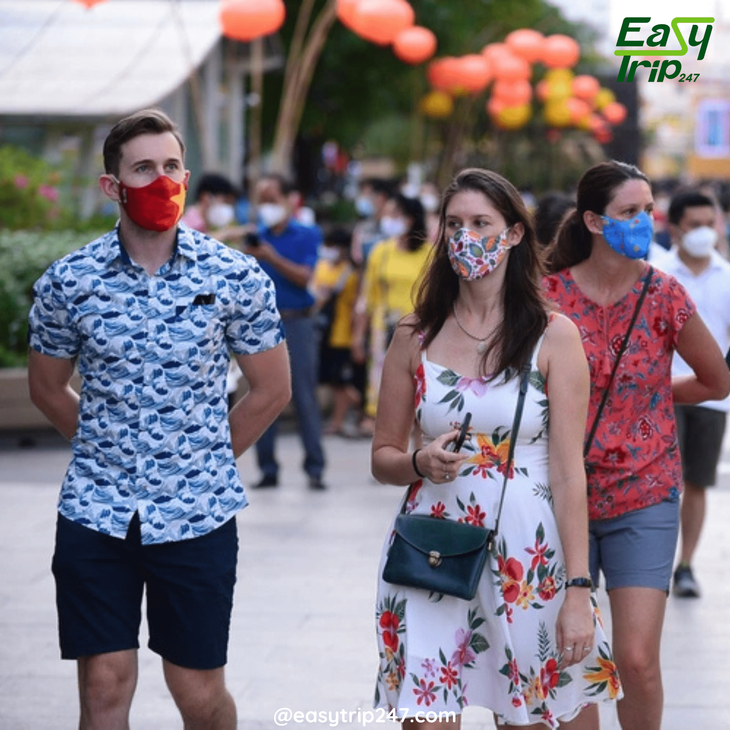
One of the top priorities for family vacations in Vietnam is health safety. While Vietnam has a relatively clean and modern healthcare system in major cities like Hanoi, Ho Chi Minh City, and Da Nang, it’s always wise to pack a family medical kit. Include essentials like insect repellent, sunscreen, hand sanitizer, motion sickness tablets, and any prescription medications. Make sure everyone in your family is up to date with vaccines, and consider travel insurance that covers family-specific concerns such as minor illnesses, hospital visits, or emergency evacuation. These small steps can go a long way in protecting your loved ones during your journey.
Vietnam is known for its bustling streets and vibrant city life. While this offers endless excitement, it also means families need to be mindful of road safety. The traffic in cities can be chaotic, with scooters weaving in and out of narrow roads. When on family vacations, always use designated crosswalks and hold younger children's hands tightly. Opt for taxis or ride-hailing apps like Grab, which are safer and more reliable than random motorbike taxis. Many families also choose private drivers for intercity travel, which adds a level of comfort and safety hard to match.
Accommodation is another crucial aspect of safe family vacations. Always book hotels or resorts that have positive reviews from families. Look for features like 24-hour security, secure entrances, childproofed rooms, and amenities such as lifeguarded pools and on-site clinics. Whether you're relaxing in a luxury resort in Phu Quoc or staying in a homestay in Sapa, feeling secure in your lodging lets the entire family relax more fully.
Food is a big part of Vietnamese culture, and it’s often a highlight of family vacations. Street food is delicious and tempting, but be selective when choosing where to eat. Stick to places that are busy and clean, and observe how food is prepared. For younger children or travelers with sensitive stomachs, it’s wise to start with cooked foods and avoid raw vegetables or unpeeled fruits. Drinking bottled water is always recommended, and many hotels provide complimentary bottles daily. Being cautious with food doesn’t mean skipping the local flavors—it just means enjoying them safely.
For families exploring Vietnam’s rich natural beauty—from Halong Bay to the Mekong Delta—being prepared for outdoor adventures is key. Wear appropriate footwear for hikes or treks, apply mosquito repellent in forested areas, and always stay hydrated. Life jackets should be worn when boating, and always confirm that equipment is well-maintained and child-friendly. Many tour companies in Vietnam specialize in family vacations, offering safety-focused services and guides trained in working with children.
Traveling with technology on family vacations has its pros and cons. It’s helpful to have devices for navigation and translation, but families should be aware of keeping smartphones and electronics secure. Use anti-theft backpacks and avoid flaunting valuables in crowded markets or public transport. Keep a list of emergency contacts, hotel addresses, and a translation card explaining allergies or medical needs, especially if you’re venturing off the beaten path.
One of the most overlooked yet vital safety tips for family vacations is preparing your children for the unexpected. Teach them your full names, where you’re staying, and what to do if they get lost. In Vietnam, people are generally kind and helpful, and children are adored. If a child is separated from the group, most locals will do their best to help. Still, consider giving kids a lanyard or wristband with your contact information. Older children can be entrusted with a basic phone or a local SIM card just in case.
Cultural awareness is another part of safe travel during family vacations. Vietnam has its own customs and traditions, and being respectful can help your family avoid misunderstandings. Dress modestly when visiting temples, always ask before taking photos of locals, and encourage your children to greet people with a smile or a simple “xin chào” (hello). Understanding local etiquette not only promotes safety but also enriches the overall experience.
When using public transport like buses or trains during family vacations, keep an eye on your belongings and make sure your family stays together, especially in busy stations. Booking soft sleeper cabins for overnight train journeys is a popular and secure choice for families. You get the comfort of privacy, and kids often love the novelty of sleeping on a train. Always arrive early and avoid overcrowded or unregistered transport providers, especially in rural areas.
One safety benefit of family vacations in Vietnam is the growing number of family-centered travel agencies and guides. These services often include child-focused activities, built-in downtime, and safe transport—all of which contribute to a smoother and safer trip. Booking with reputable agencies means less worry and more fun, especially for families exploring multiple destinations across the country.
Another tip is to practice digital safety. With Wi-Fi widely available across Vietnam, it’s easy to stay connected. But be cautious when using public networks. Use a VPN for extra security and avoid logging into sensitive accounts over open connections. Encourage teens to limit social media sharing in real time and remind them that online safety is part of physical safety, especially during international family vacations.
Lastly, flexibility and communication are key elements of safe and enjoyable family vacations
Design Your Tour Today And Get A Quote. Contact Us Here: +84.975.504.825
Source: Easytrip247 Team compiled.
